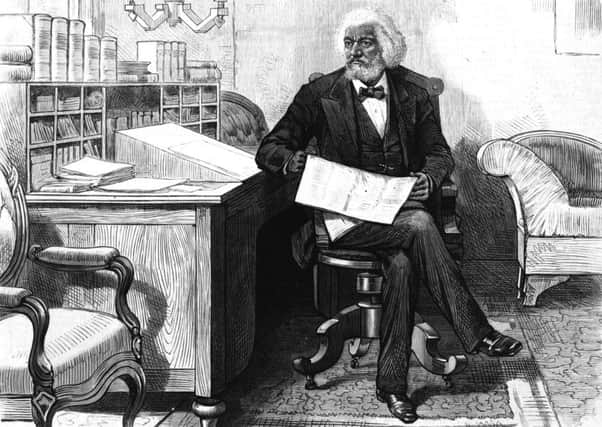Ex-slave who attacked Free Kirk '˜blood money'


Now the campaigning work of Frederick Douglass, appointed “Scotland’s antislavery agent” in 1846 when he arrived in Edinburgh on a speaking tour, is to be honoured by a major exhibition at the National Library of Scotland in Edinburgh.
Strike for Freedom: Slavery, Civil War and the Frederick Douglass Family, celebrating the 200th anniversary of Douglass’s birth, comes in the wake of a spate of racist incidents in Scotland which last week saw Anas Sarwar, Scottish Labour MSP, tweet about being racially abused in Glasgow while being interviewed about race relations and Islamophobia.
Advertisement
Hide AdLast week also saw Sean Gorman, 18, plead guilty to the racially aggravated attempted murder of a Syrian refugee in Edinburgh.
Born into slavery, in 1817 or 1818, Frederick Augustus Washington Bailey made his daring escape in 1838, aged 20, from the Aaron Anthony plantation in Maryland, setting out on a three-week walk to Massachusetts.
Celeste-Marie Bernier, professor of black studies and personal chair in English literature at the University of Edinburgh, said Douglass then went on to become “the most famous antislavery and freedom-fighter of African descent in US history”.
“As early as spring 1845, he named and shamed his white US slave-holding owners in his first autobiography, Narrative of the Life of Frederick Douglass, an American Slave,” she writes in an introduction to exhibition.
“By the autumn of that same year and fearing for his safety, he crossed the Atlantic ocean to seek protection under the mane of the British lion,” Prof Bernier writes in her essay also entitled “Strike for Freedom”.
But it was when he arrived in Scotland for the tour organised by the American Anti-Slavery Society, that Douglass, still the target of slave-catchers chasing a large cash bounty for his capture, said he felt like an equal man for the first time in his life.
Advertisement
Hide AdHe wrote that in Edinburgh “no-one seemed alarmed by my presence”.
Prof Bernier said Douglass took his “freedom name” from Sir Walter Scott’s ‘The Lady Of The Lake because he recognised a kindred spirit in Sir James Douglas, one of the leading lights in the wars of Scottish Independence.
Advertisement
Hide AdHe visited cities, towns, and villages in Scotland, including Glasgow, Dundee, Arbroath, Perth, during 1846-1847 and again from 1859-1860, his rousing oratory attracting audiences of thousands.
This was at a time when many Scots were involved in or benefited from the slave trade. The newly established Free Kirk raised £3,000 from slave-owning Presbyterian churches in the US.
Soon the phrase “Send back the money” was being chanted in the streets and daubed on walls across Scotland. “Their hands are full of blood,” Douglass would declare, quoting from the book of Isaiah in the Bible.
The exhibition will tell the story of Douglass’s fight for social justice and include his letters, speeches and photographs from the renowned Walter O and Linda Evans Collection of African-American culture, for the first time.
Ude Joe-Adigwe, regional organiser for GMB Scotland, said: “First and foremost I think that the Scottish public learning about Frederick Douglass is to be welcomed.
“Too often black people who have contributed to Scottish and black culture don’t have the profile they deserve. I’d urge people to attend.
Advertisement
Hide Ad“Having said that I would caveat my words with the harsh reminder that we’re still seeing the spectre and shadow of racist attitudes.
“The vast majority of Scots are very welcoming but we can’t be complacent.
Advertisement
Hide Ad“We are still seeing some shocking scenes and attitudes from organisations like the Scottish Defence League. It is totally unacceptable that these shocking views are still prevalent. These views don’t just exist in a vacuum, they are allowed to exist and flourish in society.
Joe-Adigwe added: “We know we will have made real progress only when black people don’t need to be campaigning for equality and feel comfortable just to be themselves, not being made to feel they have to explain or justify their existence.”
Strike for Freedom, National Library of Scotland, Edinburgh, 4 October to 17 February, 2019